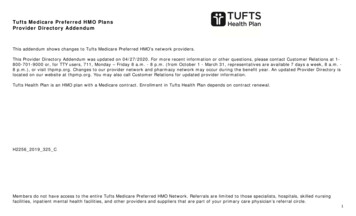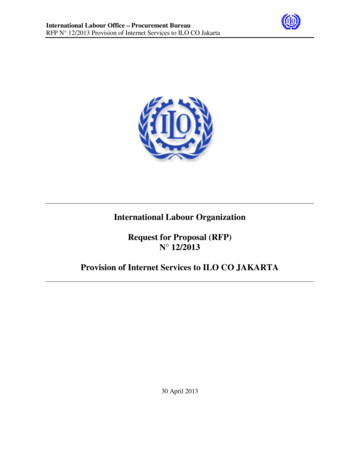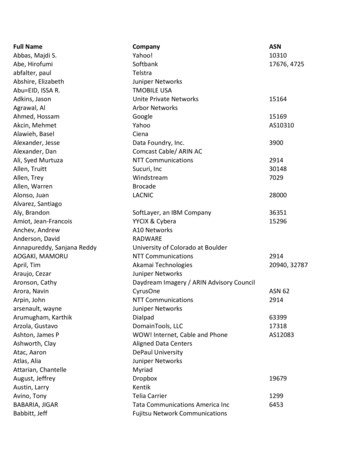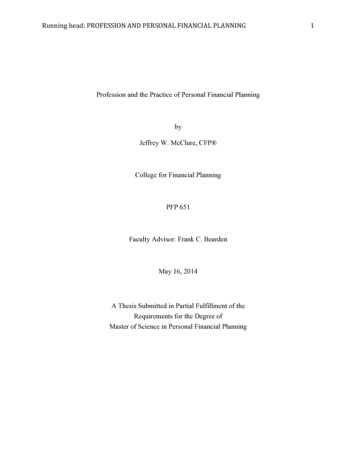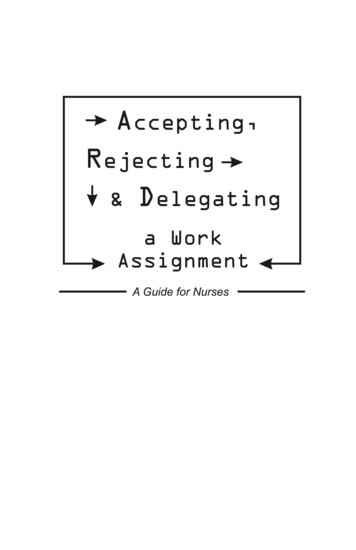
Transcription
Accepting, Rejecting & Delegating a Work AssignmentDeveloped by the MNA Congress on NursingPractice 2002Beth Amsler, RNKaren Carpenter, RNC, FNP, JD (c)Marianne Chisholm, BS, RNPhilip Donohue, RNAnn Goucher, BSN, RNCPatricia Marinelli, MS, RNAnn Mullen, BSN, RNJ. Sue Myers, PhD, RNBonnie Beth Pierce, BS, RNCMeg Wiley, BSN, RNLinda Winslow, BS, RNThe Congress on Nursing Practice is grateful tothose individuals who served on the Congressand contributed to the publication.Michelle Colloran Cook, MS, RNMichael Malone, BS, RNElizabeth Joubert, RNMary Jo Doolan, MS, RNThe Congress would like to acknowledge the assistance of MNA staffmembers Dorothy Upson McCabe, MS, MEd, RN; Shirley Duggan, MS,RN; as well as Erin Servaes, BS; and Alan McDonald, Esq. in the completion of this publication.Statement of Intent:These guidelines are not intended to be construed or to serve as a standard of nursing care.Massachusetts Nurses Association340 Turnpike StreetCanton, Massachusetts 02021Phone: 781-821-4625Fax: 781-821-4445www.massnurses.org
A Guide for Nurses Table of ContentsPurpose and Statement of Problem. . . . . . . . . . . . . . . . . . . . . 4Legal Considerations . . . . . . . . . . . . . . . . . . . . . . . . . . . . . . . 5Responsibilities. . . . . . . . . . . . . . . . . . . . . . . . . . . . . . . . . . . . 8Application of the Guide for Decision-Making . . . . . . . . . . 12Algorithm 1. . . . . . . . . . . . . . . . . . . . . . . . . . . . . . . . . . . . . . 14Algorithm 2. . . . . . . . . . . . . . . . . . . . . . . . . . . . . . . . . . . . . . 17Glossary (Board of Registration in Nursing definitions) . . . 18References. . . . . . . . . . . . . . . . . . . . . . . . . . . . . . . . . . . . . . . 22
Accepting, Rejecting & Delegating a Work AssignmentThe Guide’s purpose is to: Support the decision-making ability, responsibility, and accountability of the nurse in defining and determining his orher individual scope of practice. Improve understanding of the Nurse Practice Act (NPA)and applicable state regulations among staff nurses, nursemanagers, nurse executives, educators, and employers ofnurses as it relates to accepting, rejecting or delegating awork assignment. Provide a framework for the nurse’s decision to accept, negotiate, or reject a work assignment and to delegate nursing acts. Outline a process for evaluating the appropriateness of awork assignment and the delegation of a nursing task.Statement of ProblemThe practice of nursing is dynamic. It is continuously evolving inresponse to the changing needs, demands, and resources of oursociety. Clarifying the responsibilities of the licensed nurse (registered nurse and licensed practical nurse) is sometimes a challengefor nurses and for their employers.Accepting, Rejecting and Delegating a Work Assignment: A Guidefor Nurses addresses the questions and concerns of Massachusettsnurses regarding decision-making related to work assignmentsand the delegation of nursing acts. The Guide was developed collaboratively by the Task Force on Accepting and/or Rejecting anAssignment and the Congress on Nursing Practice and is modeledafter the document prepared by the Maryland State Nurses Association.The Guide for nurses is based on the premise that each nurse isresponsible and accountable for making decisions and for practic-
A Guide for Nurses ing in accordance with the Massachusetts Board of Registrationin Nursing (BORN), Nurse Practice Act (NPA) regulations, andwith the nurse’s educational background, competencies and experience. Although the Guide is not legally binding, it is consistentwith nursing practices set forth in the NPA.The Guide contains a brief review of Massachusetts regulations(definitions are in the glossary) concerning nursing practice standards, and the delegation of nursing. Citations to specific sectionsof the NPA are given where appropriate. A glossary is providedfor the reader. Readers are encouraged to refer to the glossary asneeded in using the Guide.Legal ConsiderationsNurse Practice Act (NPA)The purpose of the NPA is to protect the public by assuring safeand competent nurses. Only licensed nurses have the legal, formalauthority to practice nursing and to delegate nursing care. The NPAdefines nursing practice and is the legal foundation for the practice of nursing in Massachusetts. There are clarifying definitionsfor the practice of registered nurses and the practice of licensedpractical nurses issued in the form of regulation and promulgatedby the Massachusetts Board of Registration in Nursing. Thesedefinitions are written in broad language that allows for evolvingchanges in nursing practice. It is important that each nurse understand the legal definition of the practice of nursing since it formsthe basis for individual nursing practice in the Commonwealth ofMassachusetts.When a license is issued, the nurse accepts the responsibility andaccountability to be a safe, competent practitioner. The nurse musthave a clear understanding of his/her own competencies and communicate them to co-workers and supervisors.
Accepting, Rejecting & Delegating a Work AssignmentThe authority of the NPA is specific to the practice of the individual nurse (Mass General Law [MGL] and Chapter 112 §74-81C).The NPA authorizes the Board to regulate nursing practice andeducation (MGL) but does not extend that authority to employment practices, staffing patterns, or employer/employee issues.Regulations-Code of Massachusetts Regulations (CMR)Specifics related to the legal practice of nursing are determined bythe Massachusetts BORN and communicated through regulationsand advisory rulings. Regulations explain the law and provide aprocess for implementation. Regulations hold the force of law.Nurses must be familiar and comply with all of the regulationspromulgated by the Board. There are several regulations that arespecific to nursing practice and provide guidance when accepting,rejecting and delegating a work assignment.Standards of Practice (244 CMR 2:02 9:02)(Board of Registration in Nursing)The Standards of Practice describe nursing competence as: Understanding policies and procedures of the employinginstitution. Assuring that delegation of a nursing act to a licensed orunlicensed person can be done safely. Remaining knowledgeable about current nursing procedures. Obtaining the necessary training before accepting a nursing responsibility that one does not have the knowledge toimplement.
A Guide for Nurses Delegation of Nursing FunctionsThe Massachusetts BORN regulation governing Delegation ofNursing Functions (244 CMR: 3.05) gives nurses the authorityto delegate certain nursing activities to unlicensed individuals.However, the regulations specify that the nurse will determine thedegree of oversight required after an evaluation of appropriate factors [244 CMR: 3.05(3)] and the activities to be delegated [244CMR: 3.05(4)]. The delegating registered nurse shall bear full andultimate responsibility for delegation of nursing practice activities [244 CMR: 3.02]. Working beyond competencies or failure tomaintain generally accepted standards of practice places the nurseat risk for disciplinary action by the Board. The Board is authorized to take action against nurses who fail to perform in a mannerthat ensures safe nursing practice [MGL Chapter 112, § 61]. Behavior and activities that could be the basis of disciplinary actionby the Board include but are not limited to: Practicing beyond the scope permitted by the NPA [244CMR: 9.00]. Accepting a work assignment that the nurse is not competent to perform and/or failing to perform it competently. Failing to exercise oversight over individuals to whomthe nurse has delegated nursing functions [244 CMR:3.05(3)]. Abandoning or neglecting a patient. [244 CMR: 9.03(15)]. Failure to report patient abuse, practice of nursing whileimpaired by substance abuse, and diversion of controlledsubstances by licensed nurse [244 CMR: 9.03(26)].Following an investigation of a complaint against a nurse’s practice, the Board is empowered to take action (see glossary forBORN definition of complaints).
Accepting, Rejecting & Delegating a Work AssignmentEach disciplinary action is reported to the National Council ofState Boards of Nursing where it is available for review by regulation to all member boards; such listings are also sent to employersof nurses in the Commonwealth of Massachusetts.Advisory RulingsThe Board issues advisory rulings and opinions to define or clarifythe scope of nursing practice. The Board acts on an individual’srequest and the ruling is specific to the circumstances as describedin the request. Rulings are based on an extensive study of the situation. Following review of the information that has been gathered,the Board determines that a specific activity or procedure is withinthe scope of practice of the nurse, not within the scope of practice, or within the designated nurse’s scope if certain conditionsare met. Any rulings that set conditions may require specializedtraining and education, site requirements, and/or supervision requirements. Nurses should be knowledgeable about these rulingsbecause they may be helpful in making a decision about acceptingor rejecting a request to perform nursing activities.ResponsibilitiesIndividual nurses, nurse supervisors, chief nurse executives, andemployers all have responsibilities that contribute to safe, effectivepatient care. Key responsibilities of licensed nurses [244 CMR:3.00] and organizations involved in the provision of nursing careare summarized below.The individual nurse: Determines and maintains nursing competence consistentwith the NPA and Board regulations. Provides competent nursing care to patients.
A Guide for Nurses Exercises informed judgment and uses individual competence and qualifications as criteria in accepting responsibilities, seeking consultation, and delegating nursing activities to others. Clarifies assignments and assesses personal knowledge,skills, and abilities prior to accepting a work assignment. Seeks assistance and/or additional training if gaps in knowledge, skills, or abilities are identified. If necessary, negotiates options for all or part of the work assignment whenappropriate training and supervision are not available tomeet immediate patient care needs. Communicates the need for alternate means of care whenpatient needs exceed the individual nurse’s knowledge,skills, or abilities, or other available resources. Delegates only those activities which are within the nurse’sarea of responsibility and competency to delegate. Assesses the needs of patients and the documented competencyof unlicensed personnel prior to delegating nursing activities. [244 CMR: 3.05(4)]. Refuses to engage in nursing activities that are beyond theparameters of the NPA, and/or the nurse’s education, capabilities, and experience. Does not (cannot) accept responsibility and accountabilityfor an unlicensed individual performing a nursing task thathas been delegated by another nurse or individual.The nurse supervisor: Evaluates the knowledge, skills, and abilities of nursingstaff to provide care.
10Accepting, Rejecting & Delegating a Work Assignment Identifies nursing care requirements and organizes resources to ensure that patients receive appropriate care. Collaborates with the nurse to clarify work assignments.Also collaborates with the nurse to assess knowledge,skills and abilities, and options for performing a work assignment or components of it when the nurse judges thework assignment to be beyond his/her competency. Provides education to staff and supports the decision-making process regarding patient care assignments and reassignments, including patient placement and allocation ofresources. Provides the nurse with documented competencies of unlicensed personnel.The chief nurse executive:In collaboration with nursing personnel, establishes a system forprovision of care which includes defining a model of nursing practice that: Determines competencies of licensed and unlicensed nursing staff. Supports the provision of competent nursing care to patients. Provides for periodic re-evaluation of the competency ofindividuals to whom nursing tasks are delegated. Determines the competency of nurses to delegate or accepta work assignment. Recognizes that the final decision regarding delegation ofspecific tasks or accepting a work assignment is within the
A Guide for Nurses11scope of the individual nurse’s professional judgment. Institutes screening procedures, hiring practices, and education and training, which assure the provision of safe careby nurses and unlicensed assistive personnel. Conducts ongoing monitoring and evaluation of the qualityof patient care. Defines roles and responsibilities of all categories of caregivers. Provides a formal process for timely review and resolutionof conflicts related to work assignments. Assures that resources are adequate to meet patient careneeds. Initiates internal or agency disciplinary action for violationof policies and procedures of the facility.Professional RegulatoryConsiderationsNursing, like all professions, regulates itself through professionalstandards of practice, certification and an ethical code.
12Accepting, Rejecting & Delegating a Work AssignmentApplication of the Guide forDecision-Making(see Algorithms 1 & 2)Every nurse will be faced with making a decision to accept orreject a work assignment (see Algorithm 1). The nurse also maybe faced with decisions about delegation of nursing functions tolicensed or unlicensed assistive personnel (see Algorithm 2).An issue central to such decisions is: The right of the patient to receive safe quality nursing careat an acceptable level.Accepting/Rejecting an AssignmentEach nurse is directly accountable for the safety of nursing carehe/she provides [MGL 112 § 80B]. Decision making utilized bythe nurse when accepting/rejecting an assignment should follow alogical progression (see Algorithm 1).Rejecting an AssignmentIf the nurse is given a work assignment and then believes he/shemay not have the knowledge, skills, or experience to perform theassignment, he/she must consult with the supervisor and state thathe/she cannot accept the assignment. In doing so, because of thedisciplinary consequences of refusal, the nurse is responsible forthree additional steps.Step 1: The nurse needs to verbally, and in writing, inform theagency’s manger/supervisor of the perceived discrepancies between the required competence and his/her own knowledge,skills, and abilities. The nurse should keep a personal copy of thisdocumentation and the steps taken to remedy the situation. Documentation provides a record of the situation for future reference.Documentation done at the time of the incident is more accurateand complete than documentation done at a later date.
A Guide for Nurses13Step 2: The nurse should complete and file a “MNA Objectionand Documentation of Unsafe Staffing/Unsatisfactory PatientCare Form” if available or otherwise document the situation. Anurse may conclude that it is necessary to refuse to accept a workassignment. It is important for the nurse to be aware of the consequences of his/her decision to accept or refuse the work assignment. You have the right to report this practice to a public body(outside agency). (See MGL, Chapter 149, Section 186 (c) (1), AnAct to Protect Conscientious Health Care Employees (The HealthCare Workers Whistleblowers Protection Law).Step 3: The nurse needs to be prepared for disciplinary actions,which may follow as a result of the decision to reject an assignment. This action may include sanctions by the employer. Thenurse should be aware of options to contest the disciplinary action. These options are found in employer policies or contractualgrievance procedures. The nurse has the responsibility to requestthat the employer provide additional training/orientation for thenurse to practice safely.
14Accepting, Rejecting & Delegating a Work Assignment
A Guide for NursesP. Donahue15
16Accepting, Rejecting & Delegating a Work AssignmentDelegation to Licensed/Unlicensed AssistivePersonnel.Delegation of nursing activities to licensed or unlicensed assistivepersonnel (UAP) follows a pattern similar to that of evaluating theappropriateness of a work assignment [244 CMR: 3.05(2)] (seeAlgorithm 2).Step 1: Assess patient first, then state clearly the tasks to be delegated. What aspects of care will be delegated? What specifictasks are to be done? What is the condition of the patient? Is thepatient’s condition stable or unstable?Step 2: Assess the competency of the licensed/unlicensed individual. Does the unlicensed person have the documented competencies needed to do the task? Can the task be performed withoutrequiring nursing judgment? [CMR: 3.05:(2)(c)]Step 3: Confirm or reject delegation. If competencies are documented, delegation may occur. If delegation is rejected, the nursehas the responsibility to personally perform the care or seek alternate ways to provide the care. Notify the supervisor of this decision.(See Algorithm 2 for delegating an assignment to licensed or unlicensed personnel.)It is within the scope of the individual licensed nurse’s professional judgment to make the final decision, in any given situation,as to what nursing activity can safely be delegated to a UAP.
A Guide for Nurses17P. Donahue
18Accepting, Rejecting & Delegating a Work AssignmentGlossaryAbandonment—means to intentionally terminate any nurse/patient relationship without reasonable notice to the patient or appropriate other person(s), or both, so that arrangements can be madefor necessary continuation of care [244 CMR 9.02].Accountability—is the ability and willingness to assume responsibility for one’s actions and accepting the consequences of one’sbehavior (Fundamentals of Nursing, Concepts, Process and Practice; Kozier, Erb, Blais, Wilkinson; Addison-Wesley, Fifth Edition; p. 410).Advanced Practice Nurse (APN)—means a Registered Nurse towhom the board has granted written authorization, under authorityof MGL Ch. 112, §80B, to engage in advanced practice nursing asdefined in 244 CMR 4.00 [244 CMR 9.02].Authority—Permission; a right with the power to do an act (www.law.com).CMR—Code of Massachusetts Regulations.Code of Ethics—A statement that defines core ethical tenets, describes normative behaviors desired and reflects the ethical aspirations of the nursing profession. Principles of respect, beneficence,nonmaleficence, and justice guide the nursing code of ethics(Scanlon, C. A Professional Code of Ethics Provides Guidance forGenetic Nursing Practice: Nursing Ethics, 15, 366-369, 2000).Competency—means the application of knowledge and the use ofaffective, cognitive, and psychomotor skills required for the roleof a nurse licensed by the Board and for the delivery of safe nursing care in accordance with accepted standards of practice [244CMR.9.02].Delegation—The authorization by a qualified licensed nurse toan unlicensed person as defined in 244 CMR 3.05(1) to provideselected nursing services [244 CMR 3.05(1)].Liability—An obligation one has incurred or might through any
A Guide for Nurses19act or failure to act. Responsibility for conduct falling below a certain standard that is the causal connection to the plaintiff’s injury(Northrop, Cynthia E. and Kelly, Mary E. Legal Issues in Nursing:St. Louis: Mosby, 1987).MGL—Massachusetts General Law.Neglect—means the unjustified failure to provide treatment orservices, or both, necessary to maintain the health or safety, orboth, of a patient [244 CMR 9.02].Nurse Practice Act (NPA)—Statute that describes the Practice ofNursing as defined in MGL Ch. 112.Responsibility—The obligation to answer for an act done, andto repair any injury it may have caused (Black’s Law Dictionary:Revised 4th Edition, p. 1476, 1968).Work Assignment—The designation of responsibility for nursingcare or selected nursing functions that are within the scope of thenurse’s license.Glossary in Board of Registration in Nursing Definitionsre: Complaints [244 CMR 7.00]Dismissal of complaint. The Board may dismiss a complaintwhere it determines that: (a) the Board lacks jurisdiction over theperson named in the complaint; (b) there is insufficient evidence tosupport the complaint; (c) the conduct complained of does not warrant disciplinary action; or (d) a nurse has successfully completedthe Board’s Substance Abuse Rehabilitation Program (SARP) asdetermined by the SARP and the Board [244 CMR 7.03].Probation. Probation consists of a period of time during whicha nurse who holds a valid license may continue to practice nursing in Massachusetts under terms and conditions specified by the
20Accepting, Rejecting & Delegating a Work AssignmentBoard. The nurse whose license is subject to probation must comply with the terms [244 CMR 7.04(2)].Reprimand. The Board may issue a reprimand in the form of awritten statement to a nurse licensed by the Board describing themanner in which the nurse has failed to comply with any law orregulation, or both, related to the practice of nursing [244 CMR7.04(1)].Revocation. Revocation by the Board of a license to engage inthe practice of nursing in Massachusetts or APN authorization, orboth, terminates the nurse’s right to practice nursing in Massachusetts or such authorization, or both, and to in any way represent himself or herself by title or other designation as a LicensedPractical Nurse or Registered Nurse, or as authorized to engage inadvanced practice nursing, or both. Revocation of the right to renew a license to practice nursing in Massachusetts terminates thenurse’s right to renew such license [244 CMR 7.04(6)].Stayed Suspension. The Board may impose a period of suspension on a license to practice nursing in Massachusetts or on anAPN authorization, or both, or on the right to renew such license,which suspension the Board does not activate pending complianceby a nurse licensed by the Board with specified terms and conditions [244 CMR 7.04(4)].Surrender. The Board may request the surrender of a license topractice nursing in Massachusetts or APN authorization, or both,or accept the unsolicited surrender of such license or authorization, or both. The Board may also request the surrender of theright of a nurse licensed by the Board to renew such license oraccept the unsolicited surrender of such right to renew. A nurse’ssurrender of a license to engage in the practice of nursing in Massachusetts or APN authorization, or both, terminates the nurse’sright to practice nursing in Massachusetts or such authorization,or both, and to represent himself or herself by title or other designation as a Licensed Practical Nurse or Registered Nurse, or asauthorized to engage in advanced practice nursing, or both. Sur-
A Guide for Nurses21render of the right to renew a license to practice nursing in Massachusetts terminates the nurse’s right to renew such license [244CMR 7.04(5)].Suspension. Suspension of a license to engage in the practice ofnursing in Massachusetts or of an APN authorization, or both, isthe temporary denial by the Board of the right of a nurse whoholds a valid license or APN authorization, or both, to engage inthe practice of nursing in Massachusetts or to engage in advancedpractice nursing, or both, and to in any way represent himself orherself by title or other designation as a Licensed Practical Nurseor Registered Nurse, or as authorized to engage in advanced practice nursing or both. Suspension of the right to renew any licenseto engage in the practice of nursing in Massachusetts is the temporary denial by the Board of the right of a nurse licensed by theBoard to renew such license [244 CMR 7.04(3)].
22Accepting, Rejecting & Delegating a Work AssignmentReferencesAmerican Nurses Association. ANA Code of Ethics for Nurses. Washington, DC, 2001.Annotated Code of Maryland. Health Occupations Article. Title 8 §§8101 – 8- 802.California Board of Registered Nurses. (October 1998). Abandonmentof Patients.Code of Maryland Regulations, Department of Health and Mental Hygiene, Board of Nursing. Title 10, Subtitle 27.Florida Nurses Association. Guidelines for the Registered Nurse in Giving, Accepting or Rejecting a Work Assignment. May 1989.Hansten, B. and Washburn, M. Why Don’t Nurses Delegate? 1996: 26(12) 2 28.Helmelt, Mary Delores and Mackert, Mary Ellen. Dynamics of Law inNursing and Health Care. 1978.Illinois, Delegation of Nursing Care Guidelines. October 1990.Massachusetts Board of Registration in Nursing, Nursing Practice Advisory Committee Decision-Making Guidelines.Massachusetts General Law, Chapter 149, Section 186, An Act to Protect Conscientious Health Care EmployeesNational Council of State Boards of Nursing, Inc. Professional Accountability Forms the Foundation of Professional Development. 1996: 17(2), 6-7.The Maryland Nurses Foundation. Giving, Accepting or Rejecting aWork Assignment: A Guide for Nurses.The State of California Board of Registration in Nursing. Abandonmentof Patients (NPR-B-01 Rev. 10/98).West Virginia Nurses Association and West Virginia Organization ofNurse Executives. Accepting or Rejecting an Assignment: Guidelinesfor the Nurse.Zimmerman, P. Delegating to Assistive Personnel. Journal of Emergency Nursing. 1996: 22 (3): 20-212.
Provide a framework for the nurse's decision to accept, ne-gotiate, or reject a work assignment and to delegate nurs-ing acts. Outline a process for evaluating the appropriateness of a work assignment and the delegation of a nursing task. Statement of Problem The practice of nursing is dynamic. It is continuously evolving in



